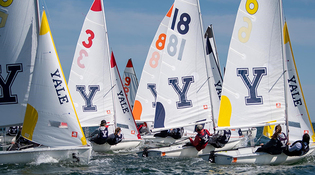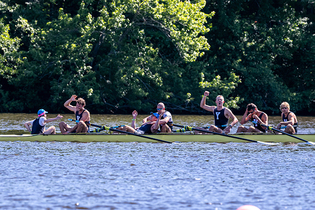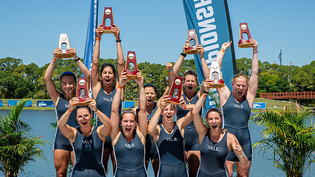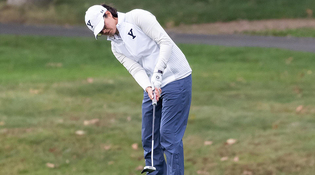
Brady Carlson
Yale’s coed sailing team (above) sailed on the Charles River in the Boston Dinghy Cup in April. Both the coed and the women’s sailing teams claimed national championships this year.
View full image
Sailing
“Yale sailing has been a dynasty for at least the last eight years.” So says Shawn Harvey ’22, named national Sailor of the Year after the Bulldogs won the Team Race National Championship in May on Louisiana’s Lake Pontchartrain. It’s hard to disagree with him. Over the last decade, the coed team has won six team racing national titles and produced four winners of the ICSA Sailor of the Year award. The women have three titles of their own over that period, including winning the first-ever Women’s Team Race National Championship this April.
Weeks later, Harvey was on the road traveling from Florida to Rhode Island, where he intends to begin a pro career in the sport. In the driver’s seat was Malcolm Lamphere ’18, his soon-to-be roommate and himself a national champion in the single-handed boat. “I know what I love to do is sailing, so I’m excited to see what professional sailing holds for me,” says Harvey, a Miami native.
Prior to his senior campaign, Harvey took the COVID year off and ended up racing against Olympic competitors—testing the waters for his own Olympic hopes in 2028. He says it was “one of the best life decisions I’ve made so far.”
The “mentally, physically taxing” experience prepped Harvey for his senior year, where “the goal was to be Sailor of the Year,” he says bluntly. Though the Bulldogs lost the fleet race national title by just one point (224 to Tulane’s low score of 223), Yale still won the Fowle Trophy as the best team overall across coed and women’s sailing. That’s their fifth in ten years despite two seasons away from the water—and that certainly sounds like dynasty material.

Lisa Worthy
The first varsity boat of the men’s heavyweight crew finished behind Cal at the national championship but bested Harvard in New London.
View full image

Lisa Worthy
The women’s second varsity boat won its grand final at the NCAA championship.
View full image
Crew
For all the success the men’s heavyweight crew has experienced over the last half decade, there was still one major piece of hardware missing from Yale’s collection. The Ten Eyck Trophy goes to the top team at the IRA national championship regatta across all eight-man boat races. Since 2003, when Yale and Harvard began competing at IRAs, only the Crimson, California, and Washington had taken the overall crown. Thanks to the first-ever national victories by Yale’s second and third varsity boats, the Ten Eyck finally belongs to the Bulldogs.
Coach Steve Gladstone, the all-time leader in IRA varsity wins, attributes the top-to-bottom team success to a culture of respect. “In this program, respect is garnered not by what boat you’re in, but by what you bring every day,” he says. The other boats are “absolutely as committed to and devoted to excellence as the guys in the first boat. That’s rare. People know that they’re valued and know that they’re respected. And it’s not contingent purely upon their athletic ability, but what they bring on a daily basis. And that’s the way it should be. That’s what it is to be respected in life.”
The first varsity boat did see its IRA streak stopped by Cal, the West’s top contender, though Yale won at Eastern Sprints for the sixth consecutive time. At the annual race with Harvard on June 11, the dominance continued, as all four boats swept Harvard for the first time since 1996. The top eight got out to an early lead against the Crimson and only built distance as the race went on, setting the upstream course record.
The men’s lightweight crew also found success, including an undefeated regular season for the varsity eight and their first win at Eastern Sprints since 2016. Headed to the IRA finals, Yale was the favorite to win a national title for the first time since 2011. Instead, Columbia jumped out to an early lead, and Yale fell off the pace, ultimately finishing fourth.
Meanwhile, strong early results rocketed women’s rowing up the national standings, where they ranked among the top five for much of the spring. At the NCAA championship, the Bulldogs earned fifth place overall—their best finish since 2009—and their second varsity eight won its grand final. And not to be overlooked: with their win over Radcliffe, as the Harvard team is still known, the women retained the Case Cup for the ninth straight season.
Lacrosse
Coming out of the pandemic, we’ve been hearing a lot about “pent-up demand.” Flights are packed, weddings are plentiful, and gas prices have surged as people are eager to make up for lost time. The same can be said for Ivy lacrosse. After two years without a full season, the Ivy League qualified a record six teams for the men’s NCAA Tournament this year, three more than any other conference.
Moreover, five of the six teams, including Yale, were ranked among the top eight in the country. Suddenly, the Ivy League is the powerhouse of men’s lacrosse.
“There was a big question mark about the league: whether or not we’d be able to come back and have success,” says attackman Matt Brandau ’23, one of the nation’s leading scorers and a nominee for the Tewaaraton Award for the top player in lacrosse. “All the Ivy League teams really proved that we’re here to stay.”
The top-heavy dominance of the Ivies meant that more than half of Yale’s regular season games this year were against ranked opponents. Despite the challenging schedule, Yale went 8–0 at home and amassed plenty of experience. “We’re used to playing against the best teams in the country on a week-in, week-out basis,” says Brandau, named a first-team All-American by multiple publications. “Every week you have to prepare like it’s the championship game.”
Yale lost to Penn in the Ivy championship, but still received the number-four seed in the NCAA field, seeking to continue their streak of success after winning the national title in 2018 and making the final game the following year. After a close win versus Saint Joseph’s in the opening round, it was, unsurprisingly, an Ivy League opponent—Princeton—that took Yale out in the quarterfinals.
As one of the eight teams remaining, the men outperformed expectations, given their young roster—the youngest in the country, with 14 underclassmen. “We’d be on the field with four or five first-years,” says Brandau. “Those guys now have NCAA playoff experience.” But youth is common across the Ivy League. With that pent-up performance released, the conference will continue to be strong.
The women also had their best season in 15 years, with a 9–2 start to the season that earned them national attention and their first appearance in the Ivy League tournament since it began in 2010. With a 6–1 Ivy League record, the Bulldogs beat Cornell in the semifinals before falling to Princeton in the championship game.
Yale had hoped to make the NCAA Tournament for the first time since 2007, but found themselves just outside of the bracket despite their competitive résumé.

Steve Musco
Women’s golf captain Ami Gianchandani ’23 made it to the US Open in June.
View full image
Golf
The eighth time was the charm for golfer Ami Gianchandani ’23. In her latest attempt to qualify for the US Open, the New Jersey native was one of thousands of women who entered 26 different events that offer spots to the biggest tournament in women’s golf.
Gianchandani’s qualifier, hosted in May in Worcester, Massachusetts, offered a single berth to the 156-player field, with the spot going to the lowest scorer after 36 holes played in just one day. After round one, the statistics and data science major trailed teammate Kaitlyn Lee ’23 by two strokes. But in the deciding round, Gianchandani birdied her final two holes to post a 1-under-par score of 69 and overtake Lee for the win and the tournament spot. Lee was named an alternate.
“Finally qualifying was an incredible feeling,” says Gianchandani, who captains the Yale women’s team. “Playing in this tournament has been a dream of mine since I was nine years old.”
Gianchandani became the first Bulldog to play in the women’s US Open since Sun Gyoung Park ’14 in 2010. At the tournament, held in June at Pine Needles Lodge and Golf Club in South Carolina, she barely missed the weekend cut after a strong showing that ranked her among the top amateurs.
Her achievement was no fluke; she has been a standout in the Ivy League despite two years of COVID interruption. In 2019, she earned simultaneous honors as Ivy Rookie and Player of the Year, and she defended her Player of the Year award this season.
The men’s team also had a notable year, winning the Ivy League title behind first-year Ben Carpenter ’25, who topped the individual leaderboard at the Ivy tournament—the third straight time a Yale golfer has done so. Winning qualified the team for NCAA Regionals, held this year at the Yale Golf Course; the Yale men finished 13th.
 loading
loading


